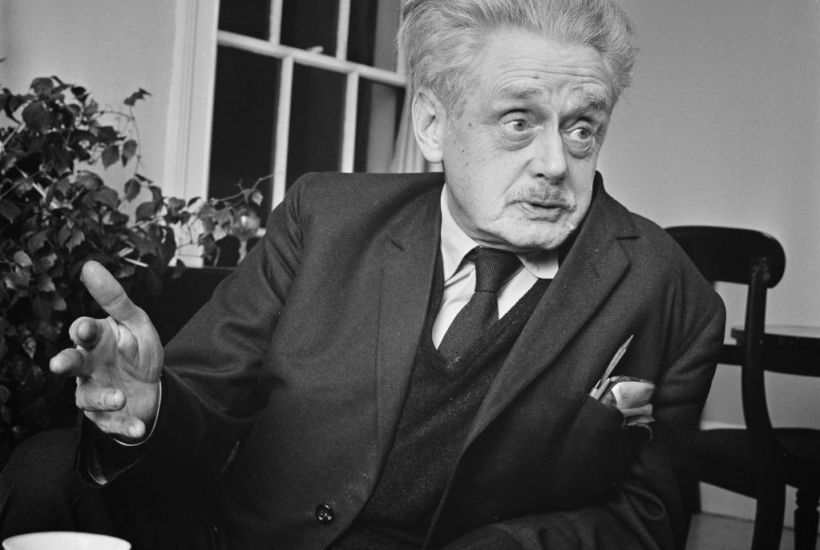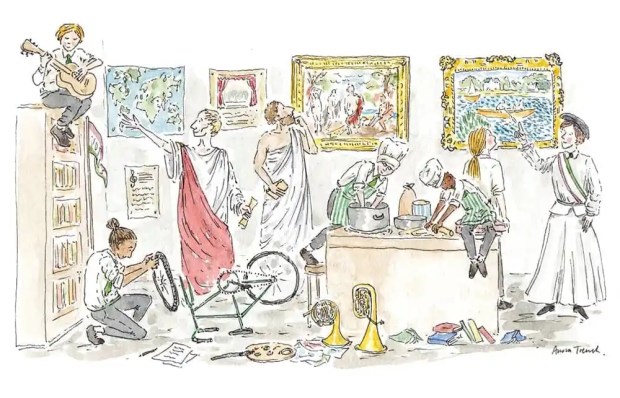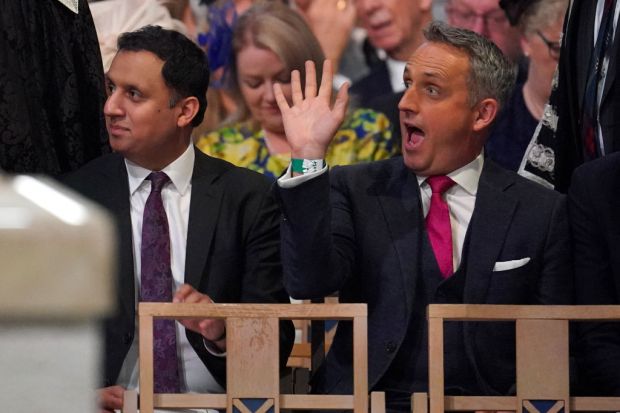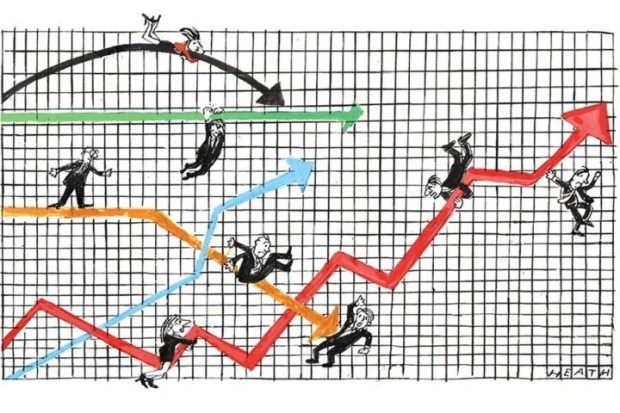The Scottish National party, under new and inferior management, continues to struggle out from under English oppression – colonialist oppression, as seems to be the view of the outward bound Mhairi Black, who wants Scotland to be the sixty-third country to escape from England. Yet, running through the SNP’s history has been a thin line of tenderness for authoritarian rule and rulers that contradicts its own struggle for freedom.
Despotic ideologies attracted thousands of followers in the 20s and 30s. Communism, inspired by the Bolshevik takeover in Russia, carried the promise of freedom and power for the working class, while fascism gained a hold in the 20s after the success of Benito Mussolini in seizing power in 1922. This support was as true in Scotland as in England. Communism attracted elements of the working class and intellectuals, while fascism had several aristocratic followers, and brought in anti-communist small business people and some skilled workers. It also, writes Gavin Bowd in his 2013 book Fascist Scotland, attracted many poor women because its branches in Glasgow, Edinburgh and elsewhere ran ‘kitchen evenings’ where free food was served.
Fascism faltered in Scotland in the late 20s. Sir Oswald Mosley’s New party, soon renamed the British Union of Fascists, revitalised it. Mosley wrote that he experienced more enthusiasm for his speeches calling for a fascist, Jew-free utopia in Scotland than in England. He visited Scotland frequently, filled the large Usher Hall in Edinburgh and prompted pitched street battles with communists and other, more democratically-inclined anti-fascists. As well as increasing membership in Scotland, he also encouraged anti-Semitic and pro-German sentiments.
The SNP was not immune to the appeal of fascism. Two leaders of the party even served time during the second world war. Arthur Donaldson, President of the party in 1960, was briefly imprisoned for suspected pro-German views. He was not, probably, a strong pro-Nazi. But he still believed that Scotland should make a deal with the Nazis in the event of a defeat of Britain and that any result – defeat, victory or a negotiated cessation of war – would put Scotland in a stronger position.
Another prisoner was the classics scholar and academic (St Andrews and Oxford), Douglas Young, a prominent member of the SNP, whose increasingly pro-German, anti-English writings in the Scottish Independent helped him become the party’s leader. A member of the Labour party as well as of the SNP, he was a strong opponent of conscription, arguing that the UK government had no right under the 1707 Act of Union to conscript Scots. He also believed, as James Mitchell and Gerry Hassan write in their 2016 book, Scottish National Party Leaders, that ‘the SNP should not be thirled (bound) to democracy, in case democracy should be in the wrong camp.’ The impression one gets, from descriptions of the party at the time, is that hatred of England often overcame hatred of the Nazis.
When this was written, in 1939, the only other camp available to Europeans, outside of democracy, were the fascist/Nazi and communist parties. Young, an imposing, black-bearded polymath, was not then alone in his scepticism of democracy, and certainly not alone in the SNP. Many of its members shared, in differing degrees, his version of believing that the enemy (Nazi Germany) of their enemy (British government) was their friend.
There is no doubt what two of the strongest 20th century haters of the English thought. Hugh MacDiarmid (a nom de plume for Christopher Grieve), who stood as a parliamentary candidate for the SNP, was proud of his prejudice, shunning contact with English comrades when he was a medical assistant during the first world war, seeing nothing good in either their character or (for the most part) their literature. A former Communist, he wrote in praise of the Soviet secret police’s purging of traitors (‘what matters wha’ we kill?’). In 2003 a researcher discovered in the National Library of Scotland an unpublished poem in which MacDiarmid had written, during the war, that London’s destruction in the blitz would be a good thing, since it was ‘earth’s greatest stumbling block, and rock of offence.’ From that inhuman view he never moved.
In our times, the greatest England-hater has been Tom Nairn, known as the ‘godfather of the modern Scottish independence movement’. Nairn died in January this year at 90. A Marxist and member of the board of the New Left Review for many years, he wrote in his 1977 book The Break Up of Britain and elsewhere a constant stream of contempt for Britain as ‘a sinking paddle-wheel state’, ‘an indefensible and unadaptable relic, neither properly archaic nor properly modern’, needing ‘a motorised wheelchair and a decent burial’.
The SNP’s dark history did not end in the modern era. Alex Salmond, leader of the party and First Minister from 2007-2014 has been – and on a good/bad day remains – the most soaring advocate of an independent Scotland. He remains a possible leader once again, as he retains support within the party and dissatisfaction with the current leader, Humza Yousaf, grows. He is still on active duty, travelling constantly in Scotland to maintain enthusiasm for independence, telling the May conference of the party, Alba, which he created that ‘we should be campaigning head held high with fellow nationalists’ – a play for re-admission to a party which he would then strive to lead once more.
Though he has no competitors in the intensity of his evangelising, he has made controversial statements regarding Vladimir Putin, telling the former Labour party strategist Alastair Campbell in 2014 that he admired Putin for his restoration of ‘a substantial part of Russian pride’ . Although he said at the time that he ‘deprecated Russian action in Ukraine and also it’s human right’s record’, this comment was made after Russia had begun to annex the Ukrainian province of Crimea.
More substantially, Salmond accepted an offer in 2017 from the Russian channel, RT (Russia Today) to chair a weekly chat show, with guests of his choosing. Salmond has frequently defended his work for the channel – with occasionally decent journalism increasingly becoming rabid pro-Kremlin propaganda during his period as a presenter – by saying he was never told what to say.
However, having a former Scottish First Minister on a Russian channel of determined mendacity helped the Russian cause merely by appearance, even if he was not supportive of the Russian regime himself. And supporting individuals who wish to break up European countries is to Russia’s benefit. He ceased to work for RT only when the Russians invaded Ukraine in February 2022.
His deputy and protégé, Nicola Sturgeon, led the party from 2014 until February this year, when she resigned from office, claiming that it had ‘taken a toll’ on her life. Soon after police began a continuing investigation into the SNP’s finances. They later arrested, then released after hours of questioning, her husband, Peter Murrell, the former SNP Chief Executive. Weeks later, Sturgeon herself was arrested and released.
Sturgeon had publicly criticised Salmond for his employment as an RT presenter and she has supported the Ukrainians in the war with Russia. Her politics, beside nationalism, are leftist, with a strong belief in gender self-definition for those wishing to transition from male to female or vice versa. Her authoritarianism does not adhere to a particular ideology, but to her behaviour in office: an impatience with any challenge and a refusal to allow discussion on central issues of party management, especially those of finance. Her SNP, similar to Salmond’s, was a top down, leader-centred organisation, where loyalty was more valued than competence. Further, she is a strong admirer of the European Union – an organisation which mirrors her own centralised, largely undemocratic party management style.
The individuals, groups and parties who succeed in achieving independence often, when taking power, descend into a worse tyranny than that they replaced. This is true today throughout South America, especially in Nicaragua and Venezuela.
Scotland is not a South American state, nor are Salmond and Sturgeon murderous despots-to-be. But the governing style of both, reveals a large danger should they achieve independence and one of them returns to power. They have, necessarily, rendered half (now substantially more than half) of the Scots population who wish to remain in the UK as betrayers of the patriotic cause, and thus, in an independent state, suspect.
The SNP has been bad enough when striving to achieve secession. If independence is achieved it may, to quote Douglas Young, not be tightly enough thirled to democracy for civil society to remain healthy.
Got something to add? Join the discussion and comment below.
Get 10 issues for just $10
Subscribe to The Spectator Australia today for the next 10 magazine issues, plus full online access, for just $10.




















Comments
Don't miss out
Join the conversation with other Spectator Australia readers. Subscribe to leave a comment.
SUBSCRIBEAlready a subscriber? Log in